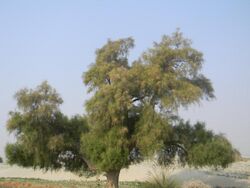Biology:Tamarix articulata
| Tamarix articulata | |
|---|---|
| Scientific classification | |
| Kingdom: | Plantae |
| Clade: | Tracheophytes |
| Clade: | Angiosperms |
| Clade: | Eudicots |
| Order: | Caryophyllales |
| Family: | Tamaricaceae |
| Genus: | Tamarix |
| Species: | T. articulata
|
| Binomial name | |
| Tamarix articulata Vahl
| |
Tamarix articulata, also called farash (Hindi: फराश), is a moderate sized tree with feathery foliage and an erect stem usually attaining a height of 40 feet to 50 feet and girth of 5 to 6 feet. It grows faster than any other species in the arid tract.
The new leaves appear by about May and small pinkish flowers, loosely arranged on slender of spikes appear from June to July and ripen in November–January. The seeds are small and reproduction from seed is fairly good, only if suitable moisture conditions are available. The tree is very hardy and capable of standing extremes of temperature and excessive drought except during its early establishment period. It is frost hardy. It coppices freely and grows readily from cuttings provided good moisture is available in early stages. It does not produce root suckers. It stands saline conditions fairly well.
References
- R N Kaul (1963): Need for afforestation in the arid zones of India, LA-YAARAN, Vol 13
- R C Ghosh (1977): Hand book on afforestation techniques, Dehradun.
- R K Gupta & Ishwar Prakasah (1975): Environmental analysis of the Thar Desert, Dehradun.
- L R Burdak (1982): Recent advances in desert afforestation, Dehradun
Wikidata ☰ Q2717418 entry


